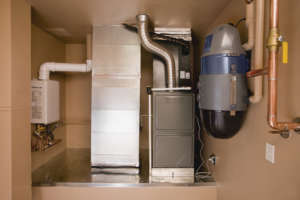
Winter’s almost here, and you know you need to prepare your home to endure the cool weather ahead. Most importantly, before the chillier temperatures, increased rainfall, and the possibility of snowstorms, you need to spend a little extra time with your furnace.
But after several years — or even several decades — of hard work, your furnace is starting to give out. It chugs along inefficiently or fails to even heat your home.
It’s time for a replacement, and you want to choose and install the perfect furnace before the cool weather truly sets in. But with so many furnace brands and types on the market, where do you even begin?
In our blog below, we’ll overview some of the main furnace types, including the pros and cons of oil, gas, and electric furnaces. With a little help from our blog and a personal consultation from an HVAC technician, you’ll have a much better idea of how to choose the right furnace for your home.
Oil Furnaces
Oil furnaces rely on heating oil to run. You can get this oil from heating oil delivery companies, some of which perform convenient local oil deliveries, and may have service and installation departments.
Furnace efficiency is measured in terms of their annual fuel utilization efficiency (or AFUE). This rating measures how much of a furnace’s fuel actually gets converted to usable energy. Today’s oil furnaces are relatively energy efficient, and oil furnaces usually have an 80% to 90% AFUE rating.
With regularly scheduled maintenance, your oil furnace can last up to 20 years.
As an added bonus, heating oil is noncombustible, so if your furnace leaks a puddle of oil onto the floor, a spark or match can’t ignite it.
Oil furnaces aren’t as popular as gas or electric furnaces, and you’ll mostly see them in older homes. If you have an older home with an existing oil furnace, talk to an HVAC technician about either replacing it with a newer model or converting it to a gas model.
Gas Furnaces
The vast majority of American homeowners use gas furnaces, especially if they live in homes with central heating systems. The AFUE of gas furnaces ranges from 80% to 98% depending on model and venting challenges.
Usually, natural gas is cheaper than electricity. And since the product comes primarily from North America, you can generally count on that price to stay stable.
However, gas furnaces usually cost more than electric furnaces to both purchase and install. They’re also inherently more dangerous than electric furnaces. Like oil furnaces, gas furnaces can release carbon monoxide fumes if they get damaged. Most homeowners will never have a problem with carbon monoxide, but you should carefully maintain your gas furnace if you purchase one.
Finally, gas furnaces don’t last as long as electric furnaces. With the right maintenance, your gas furnace will likely last 15 or so years, while an electric furnace can last twice that amount of time.
Electric Furnaces
As mentioned above, electric furnaces last longer and present fewer hazards than gas and oil furnaces. And since electric furnaces don’t use flames to heat your home, they lower your risk of experiencing a home fire, as well as your risk of carbon monoxide poisoning.
Along with their longevity, electric furnaces cost less upfront than other furnace types. You might spent only $1,000 on an electric furnace but $2,500 to $3,000 on a similarly sized gas furnace.
However, electric furnaces are usually less efficient than natural gas furnaces. And since they rely on electricity, which in turn runs on coal (usually), they also contribute more to air pollution.
Finally, your electric furnace won’t work in a power outage — although your gas furnace won’t, either, since it still relies on several electric components to function.
Other Considerations
Once you decide on the right furnace type for your home, consider these factors before you make the final purchase:
- Brand. Some furnace brands are more reputable and long-lasting than others. Your HVAC technician can give you a comprehensive overview of the best furnace brands in different price ranges.
- Cost. Although an energy-efficient furnace will save you money in the long run, you won’t make that money back for years — perhaps even several decades. If you don’t plan to stay in your home for longer than 10 years, the most expensive and most efficient furnace might not be the right choice.
- Size. No matter how efficient your furnace, you’ll still lose money to energy bills if you have a too large or too small furnace. If your furnace is too big, it will burn energy even after it warms your home; if it’s too small, it will have to work overtime to compensate for its size. Have your HVAC professional evaluate your home and recommend the right furnace size.
When you take these factors into consideration, you’ll be able to choose a furnace that will keep you and your family warm for years to come.
To get a personalized, in-depth analysis of which furnace type will work for your unique home and budget considerations, talk to your HVAC professional today.

